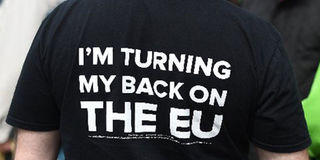Humanity knows we are better together

A campaigner wears a T-shirt bearing the slogan "I'm Turning My Back On The EU" as he attends an Anti–European Union campaign event by the United Kingdom Independence Party in Birmingham in the UK on May 31, 2016. Politicians and world leaders have dominated the headlines in the campaign for Britain's June 23, 2016 European Union referendum, but activists are fighting a passionate battle for the country's future. PHOTO | PAUL ELLIS | AFP
What you need to know:
- There is no easy divorce. All are painful. So it is not too late for the European Union and Kenya to face flaws and reform.
Just as one section of the world recognises that our planet is a global village, the other half wants to erect defences to control migrant movements. Donald Trump has spoken of building walls to keep Muslims and Mexicans out, while the Pope says a Christian should not be thinking of building walls but erecting bridges. Francis is clearly saying that Christianity is a religion without borders.
At the same time, Europe is witnessing the greatest migration of people since the Second World War. There were 1.2 million asylum applications in Europe in 2015 and an estimated 3,800 more were drowned in the Mediterranean Sea while attempting its crossing. Despite the initial welcome to Syrian and Afghanistan refugees, there is an emerging panic spreading over the European continent and the hospitality is wearing off.
Britain’s inability to control the numbers coming from Europe and elsewhere is impacting greatly on next week’s referendum set to decide whether to remain within or exit the European Union (EU). More than 300,000 people took up residence in Britain in 2015 alone, half of them coming from the EU. London is now a global city illustrated by the election last month of its first Muslim Mayor, Sadiq Khan. But the rest of the country is less integrated and very worried about “foreigners” and the future.
Of course, immigration is not the only factor at play in the vote. The decline of the Empire and the end of colonialism have never really been accepted by the English people. The decision to retain sterling pound as the currency instead of the Euro was already indicative of that. England is not used to being part of something bigger as the notion of omnipotence and empire is ingrained. It has not been subordinate or equal for half a millennium. While many other countries are comfortable with “belonging” to an EU that cannot be said about England.
Yet since the end of the Second World War in 1945, the world has been coming together in hundreds of charters, agreements and unions. While there are justifiable reasons for Euroscepticism the irrational Europhobia is unhealthy.
There are flaws in the EU but they are redeemable if reform is taken seriously. To separate from the EU would be like an “easy divorce” instead of taking time and effort to correct and address the defects.
That same challenge goes to Kenya. There was huge uproar when David Ndii wrote that project Kenya was cruel marriage and so it was time to walk away and divorce.
He pointed out the flaws and challenged everyone to address the serious divisions that exist. Failure to reform may mean that regions will want to divorce and get out of the abusive relationship with central government.
This was not alarmist. It was was a prophetic calling and its veracity is confirmed by the recent events around protests against the Independent Electoral and Boundaries Commission, police response and hate speech scenarios. The manner in which all parties have managed these events indicates that Kenya is getting more fragmented, fragile and prone to failure.
There is no easy divorce, however. All are painful. It is not too late for the EU and Kenya, then, to face the flaws and reform.
[email protected]; @GabrielDolan1





